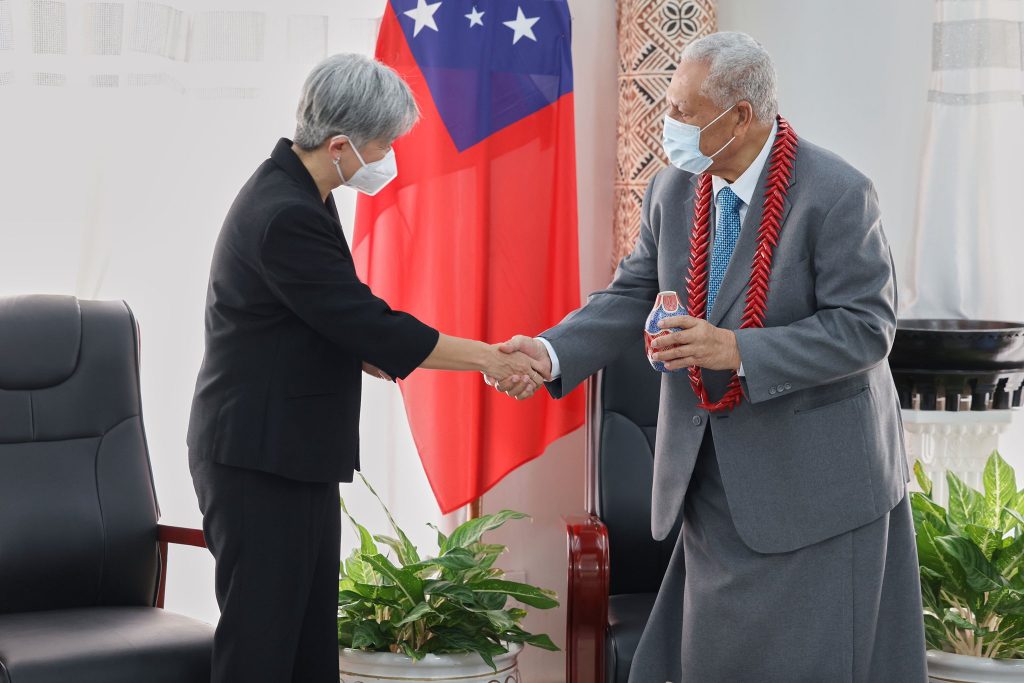Australia’s role in supporting national security in the Pacific

There’s a paradox at the heart of Australia’s security cooperation with its Pacific island neighbours. On the one hand, the Pacific will always be an area of great strategic significance for Australia, meaning that Australia will give prominence to the security interests it wants to pursue. At the same time, if Australia is perceived as prioritising its own self-interest in relations, trust will be undermined. Where Australia privileges its own institutional requirements and solutions above local agency and local solutions, this can feed negative perceptions about Australia’s intent.
To ensure that Australia isn’t imposing its concept of security on the Pacific, and Pacific island states make informed decisions on their own security free of coercive influences, Australia needs to anchor its activities to meaningful, coordinated and sustainable plans via activities and outcomes prioritised by Pacific countries themselves.
National security strategies can anchor how Australia and like-minded countries support the Pacific on security agendas that are set locally and regionally rather than paternalistically.
Security includes a multiplicity of actors—not just state actors, but also the private sector, civil society, women’s rights organisations and local leadership such as chiefly systems and subnational and non-state groups. Governance must therefore be inclusive, avoiding overly centralised systems that may exacerbate local conflicts, and efforts must be directed accordingly.
This deep contextual knowledge includes, for example, recognition of the gendered nature of security and the need to ensure women’s participation and leadership in security. It also acknowledges diversity and social inclusion, such as the large youth populations in the Pacific and the need to respond to their economic and political imperatives. National security strategies provide an anchor and set a framework against which Australia and like-minded countries can coordinate and deliver cross-sectoral efforts.
So far, four Pacific island countries—Papua New Guinea, Samoa, Vanuatu and Solomon Islands—have completed national security strategies with funding and technical assistance from Australia. These strategies differ across countries. While many threats are common to all, each strategy has a context-specific analysis of the security environment, local capabilities and gaps, and actions needed. The strategies give governments and partners tools to prioritise and deliver actions and work more cohesively, with a whole-of-government approach, to allocate resources.
National security strategies are an example of how Australia can support the sovereign decisions of Pacific island countries to identify security threats and concerns and enable appropriate responses. These strategies have become even more important as Pacific countries grapple with Covid-19 health, crime, economic and other security impacts.
The majority of Pacific island countries have yet to draft or ratify national security strategies—including Australia itself. As a priority, Australia or international partners must ensure that Pacific countries continue to have the assistance needed to create individual strategies to bring to life their commitments under the Boe Declaration. In the absence of these, there are policies and strategies that can set the priorities for aid and technical support. It is in Australia’s national interest to maintain good relationships with Pacific island countries by aligning with the priorities outlined in these Pacific strategies.
Partnered multi-agency efforts that deliver the pillars of national security strategies can provide an effective, coordinated and accountable pathway to delivering priority outcomes for Pacific countries. The Regional Assistance Mission to Solomon Islands, which ran from 2003 to 2017, and the Vanuatu–Australia Police and Justice Program, which began in 2017, provide contemporary examples of how multilateral missions work in a policing, justice and defence context. While there is always the opportunity to improve the design, a similar model with broader cross-sectoral representation, yet remaining under a unified command, would allow partners from like-minded countries and across agencies to leverage their own interests through their participation and the provision of relevant capability or financial support. This is a big idea that would significantly reduce duplication of effort and respond better to security issues—but it would require challenging prevailing thinking on program planning, delivery and funding.
Adopting a different approach doesn’t mean that Australia subsumes its own interests. Working with Pacific island countries’ national security strategies ensures that Australia has a clear understanding of Pacific peace and security at the local and regional levels, both now and into the future. This model ensures that assistance to Pacific island countries is aligned to the priorities of their individual national security strategies and respects their sovereignty and local agendas.
Most importantly, it positions Australia and its partners as true allies focused on delivering strategies envisaged by the Pacific for the Pacific.